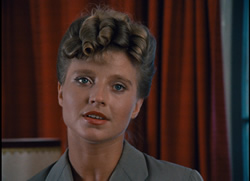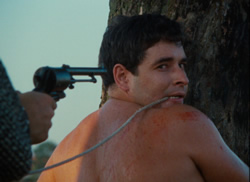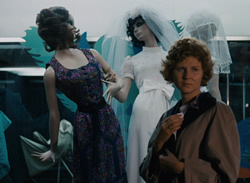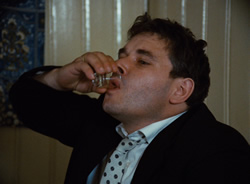
Color, 1971, 88m.
Directed by Rainer Werner Fassbinder
Starring Hans Hirschmüller, Irm Hermann, Hanna Schygulla, Andrea Schober, Gusti Kreissl, Klaus Löwitsch
Criterion (Blu-ray & DVD) (US RA/R1 HD/NTSC), Wellspring (US R1 NTSC), e-m-s (DVD) (Germany R2 PAL), Madman (Australia R0 PAL)
 Seven films into his incredibly prolific but brief career, director Rainer Werner Fassbinder struck international pay dirt with this inaugural entry in a
Seven films into his incredibly prolific but brief career, director Rainer Werner Fassbinder struck international pay dirt with this inaugural entry in a  string of melodramatic chamber pieces about the strife of domestic life. Both gritty and elegant, it quickly became a key entry in the wave of New German Cinema that also included such directors as Werner Herzog, Wim Wenders, and Volker Schlöndorff, paving the way for a string of Fassbinder masterpieces that would continue until his death a little over a decade later.
string of melodramatic chamber pieces about the strife of domestic life. Both gritty and elegant, it quickly became a key entry in the wave of New German Cinema that also included such directors as Werner Herzog, Wim Wenders, and Volker Schlöndorff, paving the way for a string of Fassbinder masterpieces that would continue until his death a little over a decade later.
Munich street fruit vendor Hans Epp (Katzelmacher's Hirschmüller) spends his frustrating days calling out his wares to the public, retiring to the bar for a few drinks too many and complaining about missed opportunities like a job on the police force, and spending the night at home in a strained marriage to Irmgard (Ali: Fear Eats the Soul's Hermann). Their daughter (Schober) is distraught by the increasing psychological violence of her parents, which leads to a physical beating that sends both wife and daughter fleeing from the house. A heart puts Hans in the hospital, but only his sister (Fassbinder muse Schygulla) seems to have genuine sympathy for the sorry hand life has dealt him. Soon he manages to pull himself together and steer onto what appears to be the right path with the aid of new assistants, but all is not as it seems.
Critics have been tempted to read this film as an allegory about the cost of Germany's postwar economic recovery since it opened, though that aspect has gradually faded over the years.  Now it feels more rewarding to approach it as a key transition in the director's affinity for effective character studies, usually with a deeply flawed individual on a downward trajectory stuck right at the center. (Fassbinder even went on to play a variation on these himself soon after in Fox and His Friends.) If that all sounds way too heavy, the film is surprisingly easy to watch thanks to the
Now it feels more rewarding to approach it as a key transition in the director's affinity for effective character studies, usually with a deeply flawed individual on a downward trajectory stuck right at the center. (Fassbinder even went on to play a variation on these himself soon after in Fox and His Friends.) If that all sounds way too heavy, the film is surprisingly easy to watch thanks to the  committed performances, the striking earthy color palette with sparing splashes of bright color, and a handful of unexpected touches like forays into the characters' extramarital dalliances and a surreal, unforgettable climactic nod to one of the kinkiest moments in Belle de Jour.
committed performances, the striking earthy color palette with sparing splashes of bright color, and a handful of unexpected touches like forays into the characters' extramarital dalliances and a surreal, unforgettable climactic nod to one of the kinkiest moments in Belle de Jour.
Successfully released in the US by New Yorker Films, who later handled it on VHS as well, The Merchant of Four Seasons hopped over to DVD in 2002 from Wellspring in an okay but badly compressed rendering of a restoration by the Rainer Werner Fassbinder Foundation. Thirteen years later, the film received a much-needed makeover with the same foundation undertaking a 4K restoration of the film with considerably more pleasing results. The fruits of their labor can be found on the 2015 Blu-ray and DVD releases from Criterion, with a transfer that comes much closer to capturing the deep, dark, rich look of the film's theatrical appearance. It's just as impressive as the label's previous Fassbinder titles (including marvelous transfers of Ali, World on a Wire, and The Bitter Tears of Petra von Kant), and the optional English subtitles and German LPCM mono audio are also excellent. The film also features a fascinating audio commentary by  Wenders, who alternates between a scene-specific reaction to the film (including notes about how people watch movies differently now and would have demanded much faster cuts) and memories of the height of the German New Cinema heyday.
Wenders, who alternates between a scene-specific reaction to the film (including notes about how people watch movies differently now and would have demanded much faster cuts) and memories of the height of the German New Cinema heyday.
On the video extra front, Hermann appears for a 6-minute chat about how she was pulled from a desk job to appear in Fassbinder films, a prospect that seemed daunting at the time, and how she developed her acting approach over the course of their films together. Then Hirschmüller gets a longer 13-minute piece about his days working on early Fassbinder films, the drastic changes in Munich after the Olympics, and the director's strict adherence to the script once rehearsals were done (which provided the only opportunity for any revisions or improvisation), as well as his thoughts on how the director created this part with him in mind from the beginning. Finally film scholar Eric Rentschler has a 26-minute overview of the film's place in the director's career and its significance in the history of German cinema, as well as a look at how this key period became a watershed in the artistic history of European filmmaking. The packaging also comes with a fold-out booklet containing a Thomas Elsaesser essay, "Downward Mobility in Munich," which ranges from a reading of the film's economic and artistic influences to an intriguing interpretation of the seemingly grim developments in the last act.
Reviewed on May 11, 2015.






